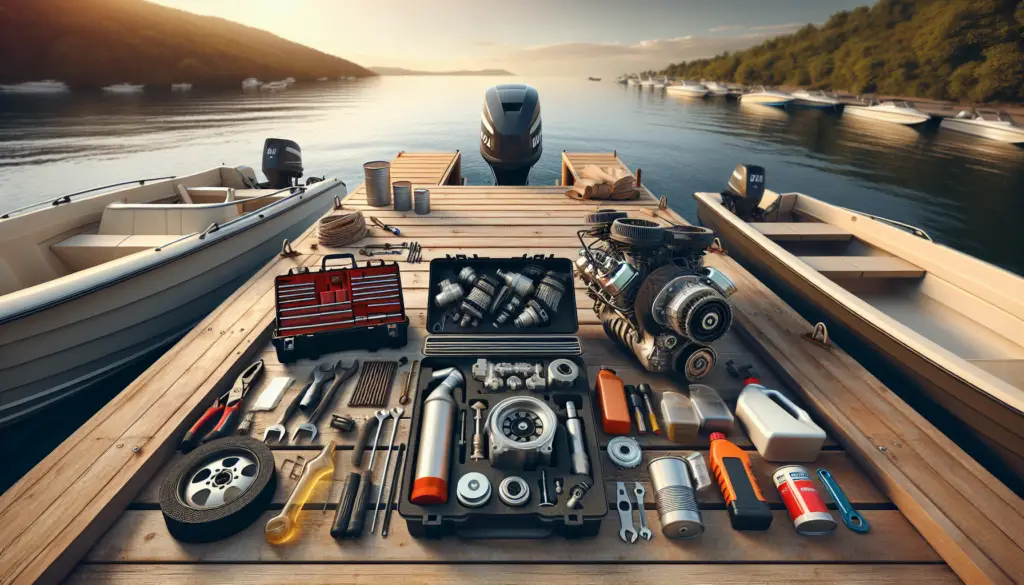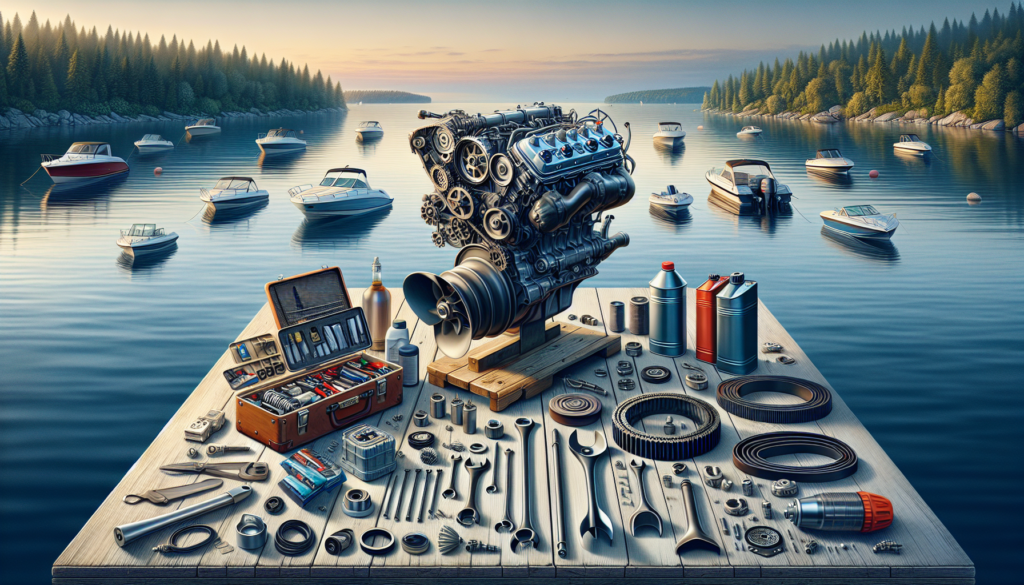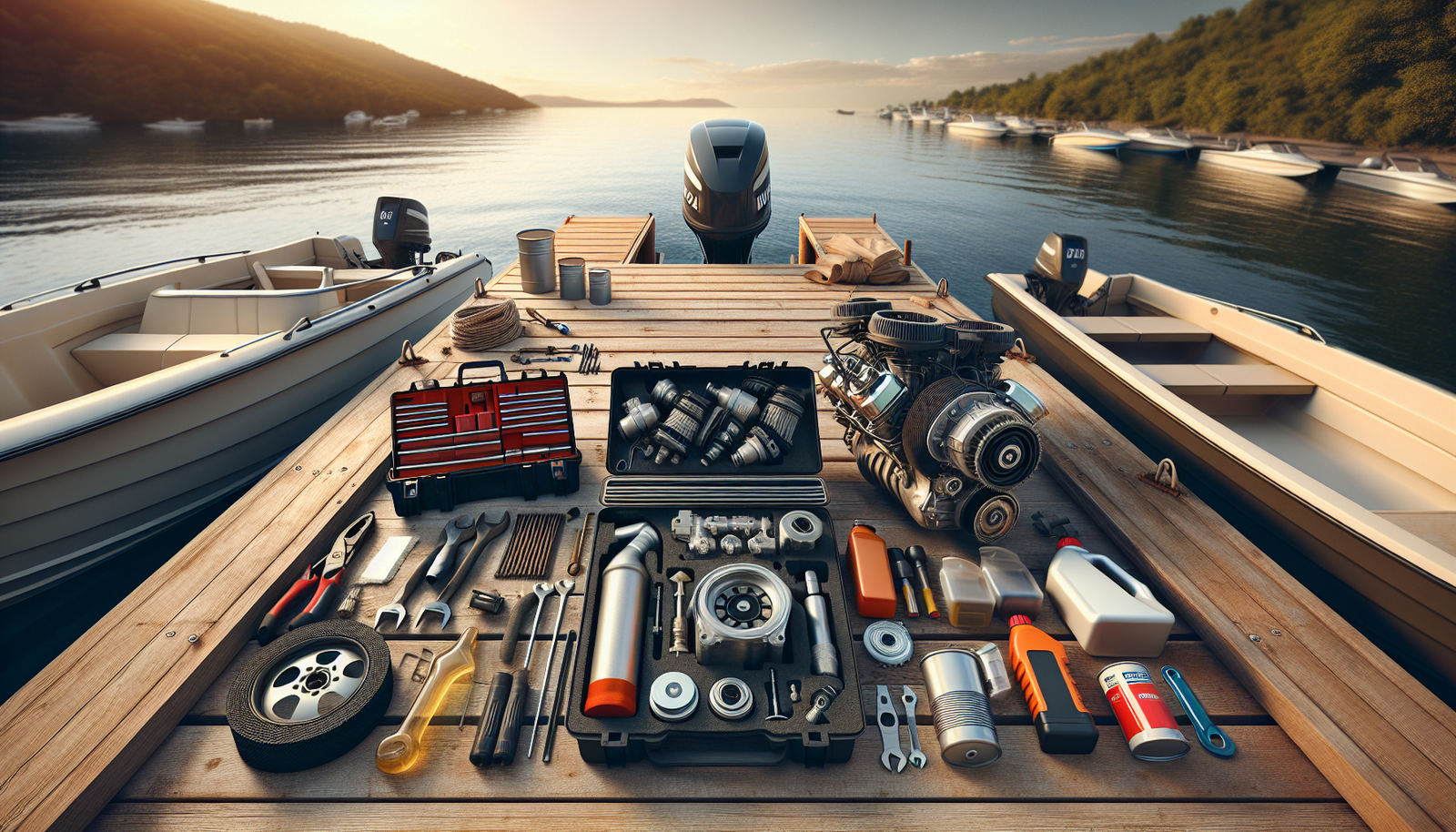As a boating enthusiast, it’s critical for you to stay up to date with the top boat engine accessories, not just for the sake of maintaining your boat’s performance, but also for ensuring safety during your seafaring adventures. “What Are The Top Boat Engine Accessories Every Boater Should Have?” provides a comprehensive guide outlining crucial engine accessories that can take your boating experience to the next level. From emergency repair tools to cutting-edge technology for efficient fuel consumption, this enlightening article ensures you’re well-prepared for every journey out on the waves.

Engine Oil and Lubricants
Understanding the ins and outs of your boat’s engine and its accessories is crucial for your vessel’s optimal operation. One of these essential components you need to be familiar with is the engine oil and lubricants.
Importance of engine oil and lubricants
Engine oil and lubricants play an indispensable role in ensuring that your boat’s engine runs smoothly. They reduce friction between the engine parts, preventing them from grinding together and causing wear and tear. Without engine oil and lubricants, your engine’s life would be significantly shortened. They also clean the engine by preventing the build-up of carbon and varnishes that could disturb the engine’s functions.
Types of engine oil
There are different types of engine oil available in the market. These include synthetic oil, synthetic blends, high mileage oil, and conventional oil. Synthetic oil performs best at extreme temperatures and has excellent resistance to shearing. Synthetic blends are a combination of synthetic and conventional oil, providing a balance between performance and cost. High mileage oil is ideal for engines with over 75,000 miles, as it contains additives that help reduce engine wear and delay the breakdown of the oil. Lastly, conventional oil is ideal for low to moderate temperature use and mild driving conditions.
How to select the right lubricant
Choosing the right lubricant can be a daunting task with so many options available. Nonetheless, determining the right one depends on several factors, including your boat’s engine type, your boat usage, and the conditions under which the boat operates. Always refer to your engine manufacturer’s recommendations to select the suitable oil and lubricants.
Fuel Filters
Another crucial component of the engine system is the fuel filter.
Purpose of fuel filters
Fuel filters serve a crucial function in ensuring the efficiency and longevity of your boat’s engine. Its primary role is to prevent contaminants such as dirt, rust, and other debris from entering your engine. Without this protective barrier, contaminants can cause damage, leading to performance issues, engine degradation, or even engine failure.
Types of fuel filters
There are two main types of fuel filters: inline and cartridge. Inline filters are located along the fuel line, while cartridge filters reside within a canister in the fuel line. Both types serve the same purpose, but their locations differ.
Replacement schedule for fuel filters
The recommended replacement schedule for fuel filters varies depending on the manufacturer’s manual. Many factors can affect the lifespan of your fuel filter, but as a general rule of thumb, it’s a good idea to replace your fuel filter annually to ensure optimal engine performance.
Engine Cooling System
Let’s now dive into the engine’s cooling system, another integral part every boat owner should know.
Understanding the cooling system
The cooling system in your boat’s engine helps regulate the engine’s temperature, preventing it from overheating. It works by circulating coolant (water or antifreeze) throughout the engine, absorbing heat, and then expelling the hot coolant out and replacing it with a cooler one.
Types of cooling devices
There are two main types of cooling devices: closed and open-cooling systems. Closed systems work by circulating coolant within the engine and then cooling it via a heat exchanger. Open systems, on the other hand, draw in fresh water from the environment, circulate it through the engine, and then discharge it back into the environment.
Maintenance of the cooling system
Regular maintenance of your engine’s cooling system is crucial to prevent engine overheating and consequential damage. Regularly check the coolant level, inspect the system for leaks, and replace the coolant as per the manufacturer’s recommendations to ensure optimal operation.

Spark Plugs
Now, let’s talk about spark plugs and their integral role in your boat’s engine.
Role of spark plugs
Spark plugs are essential for initiating the combustion process in your boat’s engine. They generate a spark that ignites the fuel-air mixture in the cylinder to propel the boat forward.
Types of spark plugs
You can find several types of spark plugs, such as copper, platinum, and iridium plugs. Copper plugs are suited for older models, and they offer excellent heat dissipation but lower lifespan. Platinum plugs provide a balance between longevity and performance, while iridium plugs have the highest lifespan but are on the pricier end.
Replacing and maintaining spark plugs
Just like any other engine component, spark plugs go through wear and tear and need replacement at scheduled intervals. The timing for replacement usually depends on the type of plug and engine, but as a rule of thumb, you should replace your spark plugs every 100 hours of operation or at least once a year.
Propellers
Propellers are arguably the most conspicuous part of your boat.
Importance of propellers
Propellers are the driving force behind your boat’s movement. They work by converting the engine’s power into thrust, which moves the boat forward or backward.
Different propeller materials
Propellers can be made from various materials such as aluminum, stainless steel, bronze, and even plastic. Each material has its pros and cons, so you need to consider factors like durability, performance, cost, and repairability when choosing the right material.
How to choose the right propeller
The ideal propeller for your boat is largely dependent on your vessel’s size, weight, and intended usage. Important factors to consider include propeller pitch, diameter, number of blades, and material type. It’s always best to consult your boat or engine manufacturer for the recommended propeller specifications.
Battery Chargers and Inverters
At this point, we need to address battery chargers and inverters, other vital accessories for your boat.
Need for battery chargers and inverters
Battery chargers and inverters are essential for powering up your boat’s electrical systems and appliances. Battery chargers ensure your boat’s battery is always adequately charged, while inverters convert the battery’s direct current (DC) power into alternating current (AC) for use by your boat’s appliances.
Types of battery chargers
There are several types of battery chargers available. These include trickle chargers, which provide a slow, steady charge ideal for maintaining battery levels during storage periods, and smart chargers, which monitor battery conditions and adjust the charging parameters accordingly for optimal charging.
How to select inverters
When it comes to selecting inverters, two main types are available: modified sine wave and pure sine wave inverters. The right one depends on your energy consumption needs, the type of appliances you use, and your budget. Always double-check the manufacturer’s recommendations for your specific appliances before making a decision.
Engine Mounts
Engine mounts are another crucial boat engine component that play a significant role in your boat’s performance.
Role of engine mounts
Engine mounts serve as the anchoring point for your boat’s engine. They absorb and isolate vibrations and shocks from the engine, preventing them from being felt within the boat. In essence, they ensure a smoother and quieter ride.
Different types of engine mounts
There are different types of engine mounts depending upon the design, material, and types of damping used. These may be elastomeric mounts, hydraulic mounts, or solid mounts, each having their suitability for different engine types and weights.
Maintenance and replacement of engine mounts
Proper maintenance and timely replacement of engine mounts are crucial for ensuring optimal engine performance and longevity. Typically, you should inspect your engine mounts at least once a year for any signs of wear and tear, and replace them every 3-5 years or as per manufacturer’s recommendations.
Water Pumps and Impellers
Now, let’s talk about water pumps and impellers, two more vital accessories for your boat.
Understanding water pumps and impellers
Water pumps circulate coolant throughout the engine, while impellers serve as the heart of the water pump, pushing the coolant through the system.
Varieties of water pumps
Water pumps come in different designs and types. The most common ones found in boats include centrifugal water pumps, submersible pumps, and bilge pumps. Each serves a specific purpose in the engine cooling or boat drainage system.
Maintenance of impellers
Impellers should be inspected at least annually for any signs of wear, and replaced as needed or at least every two years. always keep a spare impeller on board for emergencies to ensure your engine cooling system remains operational.
Fuel Injection System
The fuel injection system plays a vital role in feeding fuel into the engine’s combustion chamber.
Role of the fuel injection system
The fuel injection system delivers the right amount of fuel at just the right time into the combustion chamber of your engine. This system ensures optimal engine performance, aids in fuel efficiency, and contributes to lower emissions.
Types of fuel injection systems
There are generally two types of fuel injection systems in marine engines: throttle body injection (TBI) and multiport fuel injection (MPI). TBI systems have one or two fuel injectors mounted in the throttle body, whilst MPI systems have a separate injector for each cylinder.
Maintaining the fuel injection system
Maintenance of the fuel injection system involves periodic cleaning of the fuel injectors to remove deposits and buildup, which can cause the system to run less efficiently. Always use high-quality fuel, replace the filters regularly, and if issues persist, seek professional help to prevent major engine trouble.
Exhaust Systems
Last but not the least, let’s discuss the exhaust system.
Understanding the need for exhaust systems
The exhaust system is vital in any boat engine as it guides the combustion gases away from the engine, reducing noise, and improving engine efficiency. Essentially, the exhaust system contributes to a safer, quieter, and cleaner boating experience.
Varieties of exhaust systems
There are different types of exhaust systems like wet and dry types. A wet exhaust system mixes the exhaust gases with water before discharging them, which cools the gases, reduces noise, and minimizes the risk of fire. Conversely, a dry exhaust system doesn’t use water but relies on insulation to control temperature and noise.
Exhaust system maintenance and replacement
The exhaust system needs to be regularly inspected for any signs of leaks or damage. Maintenance includes ensuring the exhaust manifolds are not blocked, the water injection system is working correctly, and all the components are in good condition. Any faulty or worn-out parts should be replaced promptly to prevent exhaust gases from entering the boat, damaging the engine, or causing a fire.
Having the right engine accessories and understanding their roles can ensure your boating experience is safer, smoother, and more enjoyable. Whether it’s the engine oil or fuel filters, spark plugs, or propellers, each has a specific role that contributes to the overall performance and longevity of your boat’s engine. So, knowing when and how to maintain or replace them is crucial for every boater. With this comprehensive guide, you’re now armed with the essential knowledge you need to keep your boat engine running smoothly.

